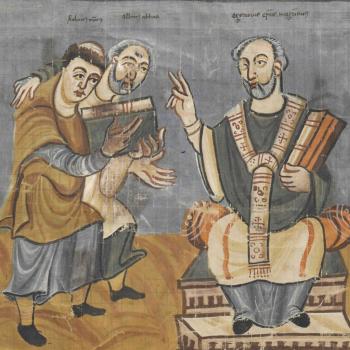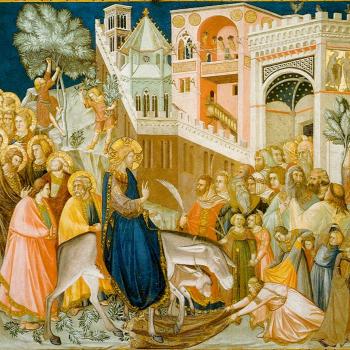In his parable of the wheat and the tares, Jesus spoke of the Devil sowing evil in the world, so that good and evil grew up together until the Judgment. Such texts seem to provide solid support for doctrines of predestination, which are difficult to find in the Old Testament except through intense proof-texting. As with the Devil and damnation, the idea is hard to find in the Hebrew Bible/Old Testament that we know.
Matters look very different, though, when we look at the literature produced in the 250 years or so before the Christian Era, during the spiritual revolution that produces so much of what we later find in Christianity, rabbinic Judaism and Islam. Not only does the Devil emerge as a ferocious enemy of the divine, but the cosmic conflict is framed in terms of determinism and explicit predestination. From birth, people seem to be irresistibly destined to salvation or damnation.
This was one of the truly surprising discoveries from the Dead Sea Scrolls, written five hundred years before St. Augustine’s time. We already knew, from Josephus, that the Essenes were strong believers in determinism, and at least some relationship between the Essenes and the Scrolls is commonly assumed. In his Antiquities, for instance, Josephus described the Essene belief that “Fate is mistress of all things, and that nothing befalls men unless it be in accordance with her decree.”
Even so, the Scrolls were stark in their ideas of absolute divine control, and predestination. Repeatedly, we find such statements prefaced with the words “Before he created…” Much quoted is The Treatise on the Two Spirits (1QS III, 13–IV, 26), which dates from the mid-late second century BC. This describes two hostile and competing realities, although scholars debate fiercely whether these are cosmic beings, or human inclinations. But whatever their nature, the spiritual conflict is deep laid. The Sons of Light needed to learn that
From the God of knowledge stems all there is and all there shall be. Before they existed he established their entire design. And when they have come into being, at their appointed time, they will execute all their works according to his glorious design, without altering anything…. He created man to rule the world and placed within him two spirits so that he would walk with them until the moment of his visitation: they are the spirits of truth and of deceit. From the springs of light stem the generations of truth, and from the source of darkness the generations of deceit.
The sons of justice walk on paths of light, and the sons of deceit on paths of darkness.
[God] created the spirits of light and darkness and on them established every deed.
In the Thanksgiving Hymns, predestination ideas are quite clear. For the righteous man, “from the womb, [God] determined the time of approval, in order that he keep your covenant and walk in [it].”“But the wicked you created for [the time] of your [wrath] and from the womb you have vowed them to the Day of Massacre.”
In the War Scroll, we read
You appointed the Prince of Light from old to assist us, for in his lot are all sons of righteousness and all spirits of truth are in his dominion. You yourself made Belial for the pit, an angel of malevolence, his dominion is in darkness, and his counsel is to condemn and convict. (1QM 13.9-11)
I have exercised restraint here in not capitalizing pit as Pit, which would suggest a more definite concept of Hell. Of such minor typographical quirks are doctrines born.
I have warned against tracing direct links from Persian and Zoroastrian systems to Judaism, but these Qumran ideas strongly recall Persian language about the struggle between truth and the lie. It’s not true cosmic Dualism, as God creates the evil force, but it is not far off. Marcus K. M. Tso offers an intriguing list of “a number of possible Persian influences in Judaism, including dualism, angelology, predestination, periodization of history, eschatology and Resurrection” ( Ethics in the Qumran Community (Mohr Siebeck, 2010), 129).
Whatever the source, we see once again a radical shift in spiritual perception, and one that would shape all the later Abrahamic faiths. If New Testament passages lend themselves to a predestination reading, that would scarcely be surprising given the Jewish thought of the time.
Some accessible books on these topics include Eugene H. Merrill, Qumran and Predestination (1975) and James C. VanderKam, The Dead Sea Scrolls Today (revised edition 2010).















